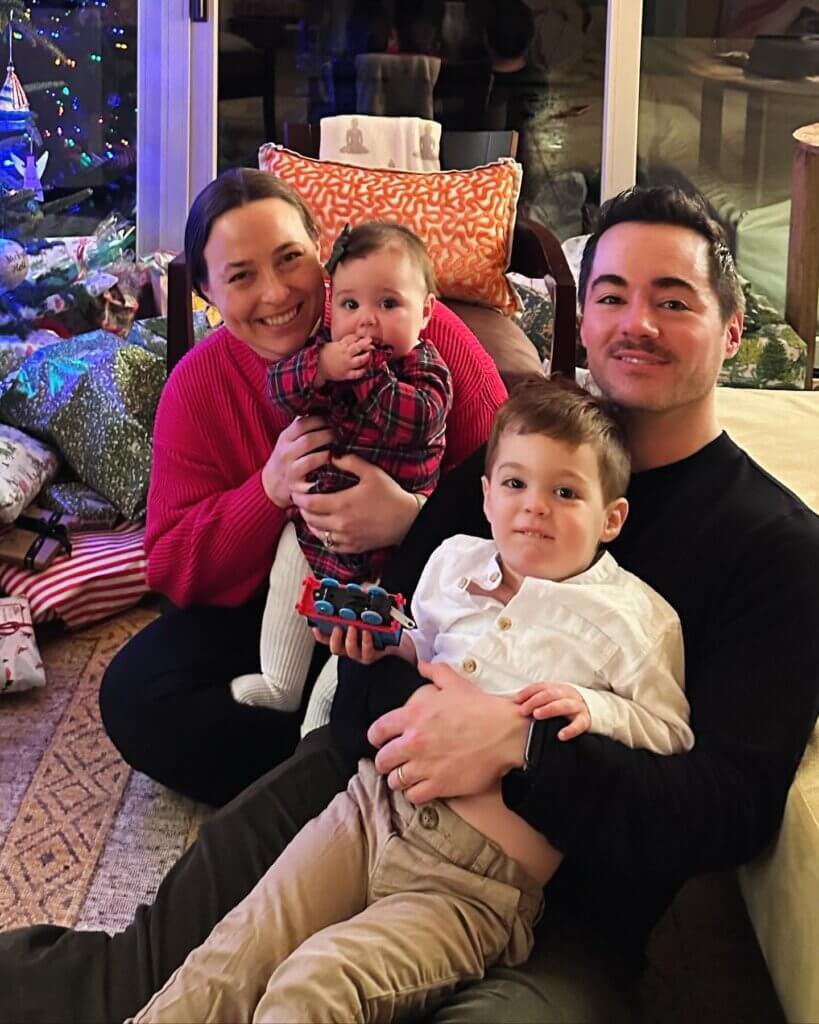For a while, Stephanie Dobson attributed her gastrointestinal issues to her pregnancy. It was her second, a girl born in May 2023, a baby sister to her son. But when the symptoms persisted for the 34-year-old mother, she raised the issue with her primary care provider.
She was encouraged to see a gastroenterologist. On an ensuing colonoscopy in September, in the final week of her maternity leave, Dobson was diagnosed with rectal cancer.
“It was a real whirlwind of news, and hormones and adjusting,” she recalls. “Really shocking.”
A rare abnormality
Dobson and her husband, Austin, moved quickly to set up treatment. In their search for a provider, they met with Dana-Farber’s Matthew Yurgelun, MD, who had a plan ready for them. Molecular testing had identified high-level microsatellite instability (MSI) in Dobson’s tumor, a molecular abnormality only found in about 2% of rectal cancers.
DNA breaks apart to replicate and then reforms much like a zipper. There is a specific order in which the base pair proteins come back together. Adenine always pairs with thymine, and cytosine always pairs with guanine. In areas that researchers call microsatellites, these pairs often repeat several times at once, increasing the likelihood that a pairing will misalign and create an error. Normal DNA will contain genes that self-correct these errors. Instability occurs when these genes are not functioning, and errors proliferate.
For Dobson, this was a bit of good news during an otherwise stressful period. Most immunotherapies can target MSI very effectively, harnessing the immune system to attack cells with high-level MSI. This makes treatment with immunotherapy for this type of cancer very effective. And immunotherapy doesn’t come with some of the lifestyle changes required by chemotherapy, radiation, and surgery. Dobson, for example, didn’t have to worry about installing an ostomy bag, and side effects from her treatment remained manageable.
Another surprise in diagnosis

Not long after this discovery, Yurgelun also confirmed that Dobson’s cancer was genetically inherited. She has Lynch syndrome, a hereditary condition that increases her risk of various cancers including colon, rectal, uterine, ovarian, and urinary tract.
Dobson had never heard of Lynch syndrome, but as she learned more about it, she thought of her children. It may have been passed down to them, putting them at risk. “That news was harder for me than the diagnosis,” she remembers.
But again, there was a silver lining in learning this information. Now, with the help of Dana-Farber’s Lynch Syndrome Center, Dobson’s family can begin the process of testing for the condition. Physicians can then make recommendations about screening procedures and set up a team of specialists.
Looking forward
Dobson’s treatment began in September at Dana-Farber’s Young Onset Colorectal Cancer Center–one of the first centers in the country dedicated to treating patients with colorectal cancer under fifty. Today, she is doing well. Her tumor is shrinking, and the fatigue she experienced at the beginning of the treatment has begun to resolve. Now, the family is looking for ways to help.
Austin Dobson, a longtime marathon runner, was training to qualify for the Boston Marathon when his wife was diagnosed. That was pushed aside for a while, but as Stephanie recovered, Austin’s goal was reignited. On April 15, Austin will run the Boston Marathon to raise funds for cancer research at Dana-Farber, as part of the Jimmy Fund’s Run Any Race initiative. To support his family, Austin has taken to training after 7:00 p.m. when the kids are in bed, even through the dark New England winter.
“Despite the fact that my treatment is going well, this story is not over for our family,” Stephanie notes. The fundraising will benefit her family for generations by supporting Dana-Farber research into interventions like cancer vaccines and the influence of lifestyle on cancer risk and will help patients receiving treatment. “I hope that other families never have to go through this,” Stephanie says. “But if they do, that it’s as supported and informed as ours is.”
She knows colorectal cancer symptoms can make people squeamish. But “trusting your gut, listening to your doctors, and following up on symptoms are all very important,” she says. And finally, she advises, “Go get a colonoscopy.”

Don’t forget prostate cancer. There’s an MSI DMMR type DFCI GU oncologist Dr Xaio Eei is treating with Keytruda (mine.) it can also be from Lynch Syndrome. Please be more thorough in your reporting.